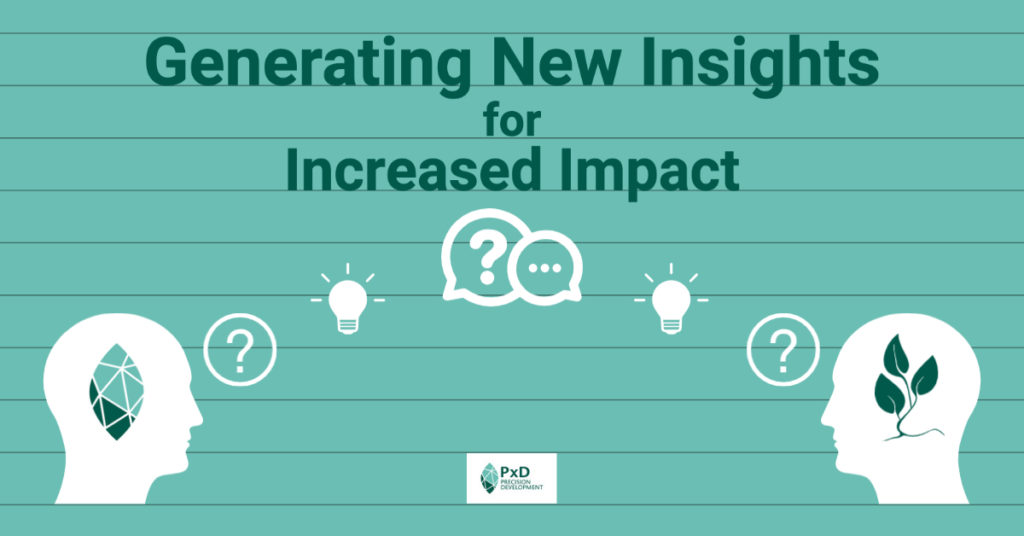Generating New Insights for Increased Impact
- August 2, 2021
- 6 minutes read
Tomoko Harigaya, PxD’s Chief Economist and Director of Research, and Caitlin McKee, Global Research Support Manager (with input from across the Research Team) detail lines of new inquiry intended to build our research base and increase the impact of our advice and services.

In 2020, PxD’s research team received dedicated funding to build out our evidence base. We are deploying these funds to support a portfolio of complementary and reinforcing projects in multiple geographic settings. This blog post describes how these new initiatives – many of which deploy innovative research methods – fit together and generate insights to advance PxD’s learning and the impact of our services.
Through the course of 2021, we commenced various innovative research initiatives with the intention of generating insights about how customized agronomic advice – facilitated and delivered by digital tools – affects farmer behavior and outcomes. A concurrent objective is to demonstrate the potential of digital agricultural extension to increase impacts over time – and at scale – through rigorous, evidence-based iteration and experimentation.
These new research activities consist of a mix of rigorous impact evaluations of PxD’s advisory services and smaller-scale testing of deep customization utilizing local or dynamic information with each project has been designed to develop insights on a combination of the following:
- Rigorous impact evidence on farmer outcomes;
- Theory of change supported by existing evidence, local data, and behavioral theories;
- Proof of concept, operational feasibility, or scalability in customizing and delivering advice; and
- Quantitative evidence to show improvements in intermediate outcomes like adoption of recommended inputs or practices.
Here are some of the ways in which these research projects will generate insights:
1. Rigorous evidence from impact evaluation on farmer outcomes:
Three impact evaluations will generate evidence on outcomes of farmer welfare:
- An impact evaluation of our Ama Krushi service for rice farmers in Odisha, for example, will measure rice yields. This impact evaluation also includes an assessment of the feasibility and accuracy of satellite-based approaches to rice yield measurement.
- An impact evaluation of Dairy Advisory Services in Kenya will make use of partner dairy cooperatives’ administrative data on output and sales to evaluate the impact of dairy advisory on farmers’ welfare, measured by milk production and profits.
- A third impact evaluation of the Coffee Agronomy Training in Uganda (UCAT) service will generate evidence on the impact of PxD’s stand-alone mobile phone-based advisory service on coffee yields, and the impact of PxD’s advisory messages as a complementary service to an in-person agronomy training on management practices.
2. Theory of change supported by existing evidence, local data, and behavioral theories:
In its second year of implementation, the treatment arm of the Ama Krushi impact evaluation will incorporate A/B tests to generate evidence against hypothesized causal mechanisms about how digital advisory can encourage farmers to adopt recommended practices, further building out PxD’s theory of change. The Dairy Advisory Service in Kenya will run content development workshops to source local insights to build out our theory of change and refine our understanding about how digital advice can address barriers to improved livestock management and achieve desired welfare gains.
3. Proof of concept, operational feasibility, or scalability of customization and the delivery of advice:
Agro-dealer engagement activities in Kenya will include mechanisms to identify a low-touch and scalable model for building a network of agro-dealers we can tap into to complement and reinforce MoA-INFO messaging with, and improve market linkages for, farmers. Our intention is to design and create services that agro-dealers will find valuable and engage with, and then generate insights about how these services can affect farmer’s input search behavior and access to inputs. We are piloting various strategies via our Krishi Tarang service in Gujarat to recruit and collect information from agents who live and work in communities where PxD’s farmer users live. This project will assess the feasibility of different approaches for crowdsourcing information from agents and farmers to improve the relevance and timeliness of advisory content. Crowdsourcing techniques can potentially inform approaches for collecting other time-dependent and/or locally relevant information such as GPS location data, the prices that farmers pay for inputs, the prices that farmers receive for produce, and weather-related information.
4. Quantitative evidence to show improvements in intermediate outcomes:
The Digital Tools for Extension Agents project in Rwanda aims to understand the motivations of volunteer community extension agents known as Farmer Promoters (FPs), and test the impact of motivational messages, customized to individual agent’s personality traits, on the performance and outcomes of the farmers they advise. We will generate quantitative evidence on FP performance to assess the marginal impact of better-targeted advice for FPs on farmer learning and outcomes, the impact of nudges on different activities, and how FPs allocate their effort when they’re being incentivized to work on a particular task. The Peer Group Learning project in Kenya aims to demonstrate the potential value of organizing users of PxD’s digital agricultural advisory service into peer groups. This project will generate quantitative evidence on improved knowledge and adoption of recommended practices through peer learning promoted via farmers’ organizations. In order to better understand this learning pathway, we will measure engagement with the MoA-INFO platform, the volume of communication within a peer group, and user trust in the information that is shared.
Summary of projects with categories and insight types to be generated
| Project | Location | Insight types |
| 1. Impact evaluation of Ama Krushi service for rice farmers | Odisha, India | i, ii, iii, iv |
| 2. Impact evaluation of Dairy Advisory Services | Kenya | i, ii, iii, iv |
| 3. Impact evaluation of Coffee Agronomy Training | Uganda | i, iii, iv |
| 4. Digital Tools for Extension Agents | Rwanda | iii, iv |
| 5. Peer Group Learning | Kenya | iii, iv |
| 6. Crowdsourcing Pest Information | Gujarat, India | iii |
| 7. Agro-dealer Engagement | Kenya | iii |
We have intentionally designed these initiatives so that they reinforce and complement one another. While these activities remain nascent, we are very excited by their potential to generate insights and increase the impact of our work across geographies and contexts.

Stay Updated with Our Newsletter

Make an Impact Today


